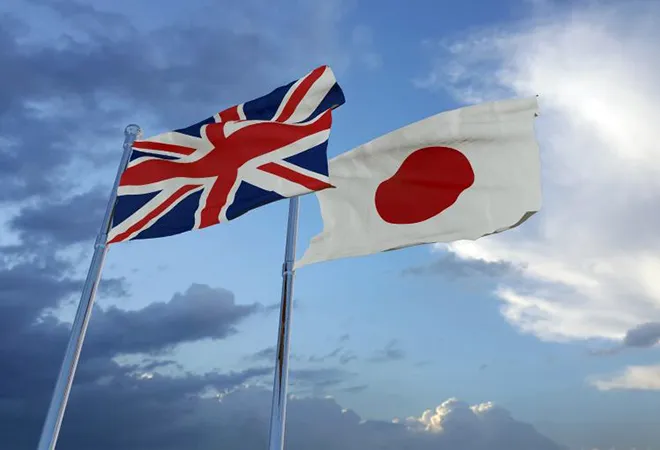
Japanese Prime Minister Yoshihide Suga, despite his busy fight against the COVID-19, has also been steadily strengthening Japan’s commitment to the Free and Open Indo-Pacific (FOIP) strategy ever since he assumed office. After holding the meeting of the Foreign Ministers of the QUAD countries in Tokyo in October last year, he undertook his first foreign visit to Vietnam and Indonesia to give a boost to the FOIP vision. The same enthusiasm was shown by him in inviting Australian Prime Minister Scott Morrison to visit Tokyo in November last year and they signed a significant agreement on the transfer of defence equipment and technology.
It is in this context one has to examine the rapidly advancing strategic interests of Japan and the United Kingdom in the Indo-Pacific region in recent months. Following its exit from the European Union, Britain has been exploring new economic and strategic opportunities elsewhere and the Indo-Pacific obviously is considered as an attractive alternative. The coming into effect of a free trade agreement with Japan in January 2021 marked the first step towards its joining the multilateral Comprehensive and Progressive Agreement for Trans Pacific Partnership (CPTPP).
Both Britain and Vietnam signed a free trade agreement in the last week of December 2020, which would not only enhance their bilateral trade but could also help the UK’s admission to the CPTPP.
Also, Britain is now seeking a new role for itself in the Indo-Pacific region, following intense deliberations within its official circles that underscored the unlimited potential that the Indo-Pacific region offered in trade and investment. And to begin with, both Britain and Vietnam signed a free trade agreement in the last week of December 2020, which would not only enhance their bilateral trade but could also help the UK’s admission to the CPTPP. Vietnam has assured that it would make all efforts to facilitate its early entry. Having applied for its membership of the 11-member forum, formal negotiations for Britain’s entry will start anytime during the next couple of months. British Prime Minister Boris Johnson was quite upbeat about the development and stated, “One year after our departure from the EU, we are forging a new partnership that will bring enormous economic benefits for the people of Britain.”
While stronger UK-Japan economic relations would undoubtedly bring numerous benefits to both the countries, their converging strategic interests carry long term implications for the Indo-Pacific. The Japan-UK Foreign and Defence Ministerial Meeting (2+2) held on 3 February 2021, clearly highlighted the deepening British interests in the peace and security of the Indo-Pacific region. The meeting was attended by the defence and foreign ministers of both the countries. It was the fourth edition of the meeting though it met after a gap of three and a half years. It provided a good opportunity for the four ministers to exchange views on a wide range of security and economic issues affecting specially the Indo-Pacific region.
Both Japan and Britain are maritime nations who share a strong commitment to basic values like freedom, democracy, human rights, and the rule of law.
One major subject that was discussed by the four ministers was the maritime security of the region. Both Japan and Britain are maritime nations who share a strong commitment to basic values like freedom, democracy, human rights, and the rule of law. At the 2+2 meeting, the ministers reiterated their support to uphold a rules-based regional order that would respect freedom of navigation and overflight in the open sea. They expressed their serious concerns about the deteriorating security situation in the South and East China Sea areas and strongly opposed any unilateral attempts on the part of any country to change the status quo. They urged all countries to exercise self-restraint and desist from activities that would heighten tensions in the region. Emphasising that the South China Sea arbitration award issued by the UNCLOS arbitration tribunal “is final and legally binding” on all parties to the dispute, they also underlined that any code of conduct in the South China Sea should be in conformity with international law as reflected in the UNCLOS.
The discussion on maritime security at the ministerial meeting assumes greater strategic relevance in the wake of a new coast guard law passed by China which increases tensions in the region as it authorises its coast guard vessels to “take all necessary measures, including the use of weapons, when national sovereignty, sovereign rights, and jurisdiction are being illegally infringed upon by foreign organisations or individuals at seas.” Further, it also authorises the coast guard to demolish other countries’ structures built on areas claimed by China and to seize or order foreign vessels illegally entering China’s territorial water to leave.”
Even before enacting the latest law, Chinese vessels were regularly intruding into the territorial and contiguous waters of Japan leading to escalation of tensions.
Japan is naturally concerned about the new law as it could seriously complicate and undermine its position in the East China Sea where the Senkaku islands are located. Even before enacting the latest law, Chinese vessels were regularly intruding into the territorial and contiguous waters of Japan leading to escalation of tensions. But now, after the enactment of the new law, Chinese vessels have already started transgressing the territorial waters of Japan posing a new challenge to Japanese sovereignty. In the wake of the rising tensions in the maritime domain, Tokyo believes that the growing British interest in the Indo-Pacific will be a valuable factor in the realisation of the FOIP vision.
Significantly, Japan supports the decision of Britain to dispatch its aircraft carrier Queen Elizabeth with its strike group to the region during 2021 and considers it as the beginning of its deeper involvement in the regional maritime security. The British Defence Secretary has hailed the despatch of the carrier as the most significant Royal Navy deployment in a generation.
The views expressed above belong to the author(s). ORF research and analyses now available on Telegram! Click here to access our curated content — blogs, longforms and interviews.




 PREV
PREV


